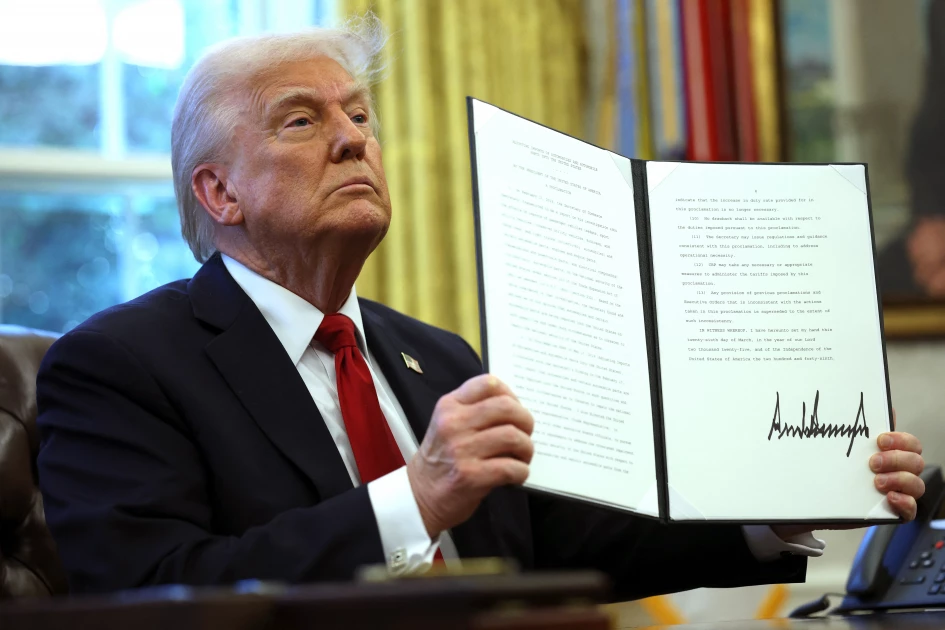
Kenya’s economy has long relied on the importation of second-hand clothing, known locally as mitumba. However, this sector, combined with systemic corruption, led to the country being placed on former U.S. President Donald Trump’s tariff list. This move had significant implications for Kenya’s trade relations with the U.S. and the broader East African region.
The Importance of Mitumba in Kenya’s Economy
Mitumba plays a crucial role in Kenya’s economy by providing affordable clothing to millions of citizens. Additionally, it is a major source of employment, with thousands of traders, wholesalers, and retailers relying on it for their livelihoods. According to the Mitumba Consortium Association of Kenya (MCAK), the industry contributes over Ksh15 billion in taxes annually and employs approximately 1.4 million people. This makes it one of the most significant sectors in Kenya’s informal economy.
Despite these benefits, the mitumba trade has been controversial, with claims that it suppresses local textile industries. The government has at times considered policies to promote local production and reduce dependency on second-hand clothing imports. However, such measures have faced strong opposition from traders and international partners, particularly the United States.
Kenya’s Attempt to Ban Mitumba Imports
In the mid-2010s, the East African Community (EAC) proposed a phased ban on mitumba imports to encourage domestic textile manufacturing. Kenya, along with Uganda, Rwanda, and Tanzania, planned to phase out second-hand clothing imports by 2019. The objective was to revitalize local industries and create jobs in the textile sector.
However, this move sparked backlash from the U.S. government. In 2017, the Office of the United States Trade Representative (USTR) warned that countries implementing a mitumba ban risked losing benefits under the African Growth and Opportunity Act (AGOA). AGOA allows eligible African nations to export certain goods to the U.S. duty-free. Facing the threat of losing trade privileges, Kenya abandoned its plans to ban mitumba, while Rwanda proceeded with restrictions and faced punitive trade measures.
Corruption and Tax Evasion in Kenya’s Trade Policies
Corruption is a persistent challenge in Kenya, particularly within the Kenya Revenue Authority (KRA). A 2019 anti-corruption crackdown led to the arrest of 75 tax officials for allegedly assisting businesses in tax evasion and fraudulently clearing cargo. This highlighted the deep-rooted corruption that affects Kenya’s trade practices and tax collection efforts.
In 2023, the Auditor-General’s report revealed that KRA failed to collect over Ksh150 billion due to tax underreporting by businesses. Many large and medium taxpayers manipulated financial statements to reduce tax liabilities. This level of corruption has severe economic consequences, including reduced government revenue and weakened trade relations with global partners.
U.S. Response: Tariffs and Trade Barriers
Due to Kenya’s perceived trade barriers and corruption issues, the U.S. imposed a 10% tariff on Kenyan exports under President Trump’s administration. The USTR cited Kenya’s 35% import duty on second-hand clothing and agricultural subsidies as barriers to free trade. The U.S. administration sought to level the playing field by imposing reciprocal tariffs on Kenyan goods.
These measures placed additional pressure on Kenya’s economy, affecting exports such as flowers, tea, and coffee—key sectors that depend on the American market. Additionally, the restrictions signaled a decline in Kenya’s trade credibility, pushing the government to implement reforms to restore confidence among international partners.
Several African states trading with the U.S. were slapped with the 10 per cent base tariff, such as Rwanda, Burundi, Eritrea, South Sudan, Sudan, Ethiopia and Uganda.
Trump imposed higher tariffs on others like Nigeria (14%), Malawi (17%), Zimbabwe (18%), DRC (11%), Zambia (17%), and Mozambique (16%).
But others, like Lesotho, will suffer the most from the U.S.’s new tariffs. The southern African country, which the White House said charges America a 99 per cent tariff, was hit with a 50 per cent reciprocal tariff.
Others are Mauritius – 40% (charges U.S. 80%); Botswana – 37% (charges U.S. 74%); Algeria – 30% (charges U.S. 59%); and Tunisia – 28%. It charges America 55%
The Future of Kenya-U.S. Trade Relations
Kenya has taken steps to improve its trade policies and governance to regain favorable trade terms with the U.S. Efforts to strengthen anti-corruption measures, enhance tax compliance, and modernize trade policies have been initiated. The current administration is also negotiating a bilateral trade agreement with the U.S. to replace AGOA once it expires in 2025.
If successful, these reforms could restore Kenya’s standing in global trade and create a more sustainable path for its textile industry. However, continued vigilance against corruption and a balanced approach to economic policies will be necessary to ensure long-term stability.
Read: Moi University Declares Redundancy Due to Financial Struggles
Kenya’s inclusion on Trump’s tariff list was driven by a combination of factors, including the mitumba trade and widespread corruption. While mitumba remains vital for Kenya’s economy, trade policies and governance issues have strained relations with the U.S. Moving forward, Kenya must address corruption and implement sound trade policies to strengthen its global economic position. As negotiations for a new trade agreement continue, Kenya has an opportunity to rebuild its trade relations and ensure sustainable economic growth.





